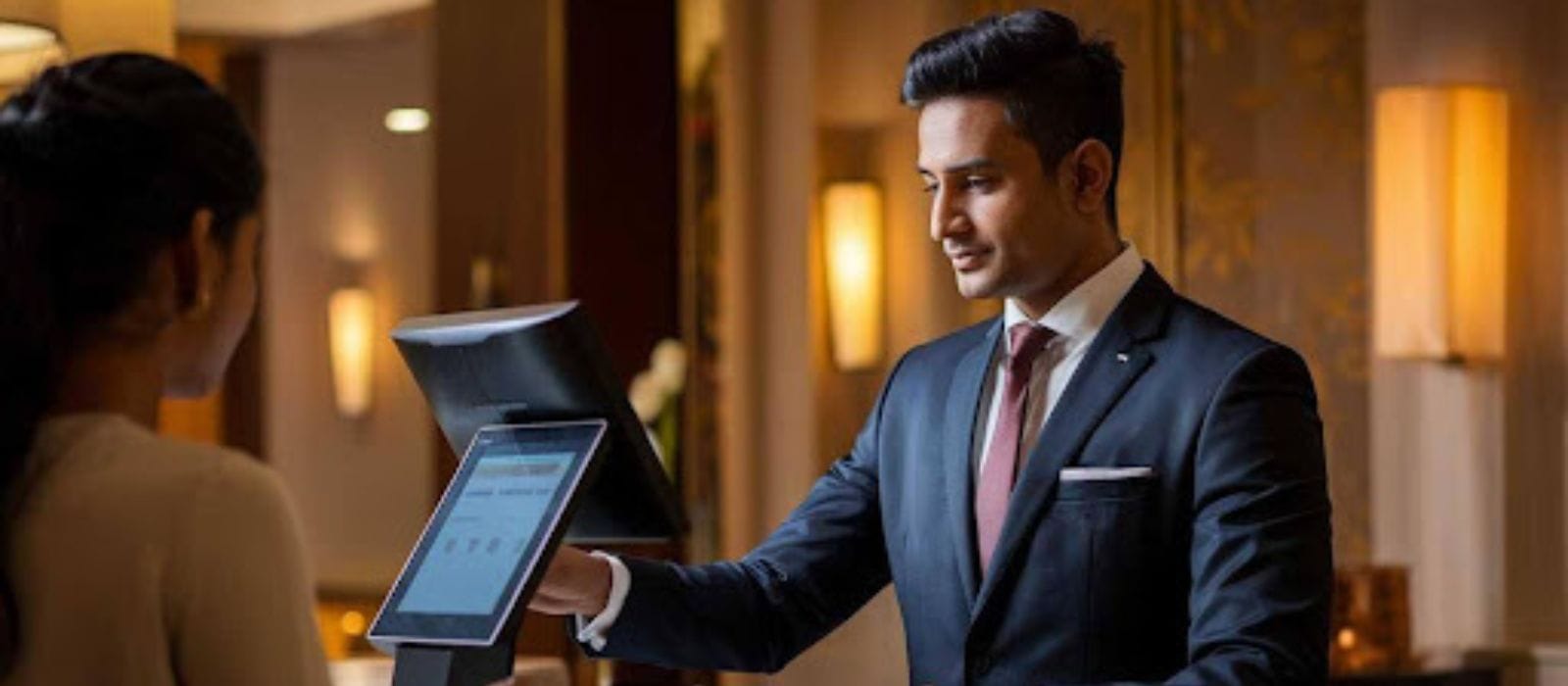What is POS? How Does It Work in a Hotel?

- March 22, 2025
What is a POS System?
A Point of Sale (POS) system is a combination of hardware and software. It basically facilitates transactions between businesses and customers. Traditionally, a POS system used to function as a simple cash register that recorded sales and handled payments as well. However, as time passed with technological advancements modern POS systems have evolved into sophisticated digital platforms. These platforms nowadays manage a wide range of hotel operations. These include sales, inventory, payments, customer data and financial reporting.
In the hotel industry, a POS system is much more than a tool for processing payments and the benefits of using POS systems in hotels cannot be emphasized enough. A hotel POS acts as a centralized system that integrates various departments like restaurants, bars, spas, banquet services and retail outlets. These systems ensure that there are seamless operations and real-time financial transparency. A hotel POS system enhances guest experiences plus it improves business efficiency.
Components of a POS System in a Hotel
A hotel POS system comprises of several essential components. These include hardware as well as software elements that work together to streamline hotel operations.
Hardware Components
-
Touchscreen Terminal
Using these digital interfaces hotel staff members can process transactions efficiently. They can take orders and access real-time data.
-
Receipt Printers
These printers are used to generate itemized bills for guests who are dining at hotel restaurants, bars and other outlets.
-
Cash Drawers
These are basically storage units for cash transactions. They are quite secure in nature and ensure that there is safe handling of money.
-
Card Readers
Card Readers are devices that in short facilitate secure credit card, debit card and contactless payment transactions.
-
Barcode Scanners
Barcode Scanners are used in retail shops and inventory management. They are used to track products and manage stock efficiently.
-
Touchscreen Terminal
Simplify Hotel Management — Upgrade POS Systems
Software Components
-
Billing and Transaction Processing
This software component ensures that there is accurate and efficient handling of payments when invoices are generated.
-
Inventory Management
This particular element tracks stock levels in restaurants, bars, spas and gift shops. It basically prevents shortages and overstocking.
-
Integration with Hotel Property Management System (PMS)
In this, financial data and transactions are synced across different hotel departments.
-
Customer Relationship Management (CRM)
The CRM component stores guest preferences by analysing purchase history. Further it manages loyalty program data for personalized service.
-
Reporting and Analytics
In this, real-time financial reports are generated. It further analyses sales insights and business performance metrics.
-
Billing and Transaction Processing
How Does a POS System Work in a Hotel?
A hotel POS system functions as an integrated hub. It connects various sales points within a hotel. It ensures that there is efficient management of all transactions. Let’s check it out how a POS system operates across the various hotel departments:
Integration with the Property Management System (PMS)
A POS system integrates with the hotel PMS quite seamlessly. So, guests can charge purchases directly to their rooms. This eliminates the need for multiple payment transactions. It provides guests with a unified billing experience during their checkout. It could be about a guest ordering room service or a spa treatment. It could be about dining at the hotel’s restaurant too. All such charges are automatically linked to their room account.
Processing Payments at Various Hotel Outlets
Hotels operate multiple revenue-generating outlets. These are restaurants, bars, spas, banquet halls and retail stores. A POS system centralizes all these transactions across these various outlets. As a result, it lets processing of all kinds of payments whether it is via cash, credit/debit cards, digital wallets and room charges. When there is this level of integration it ensures that there is accuracy in billing and financial transparency.
Managing Hotel Restaurants and Bars
-
Menu Management:
In a POS system there is real-time menu updates, digital menu displays and automated price adjustments. These are all based on promotions and seasonal changes.
-
Table Reservations:
Guests can book tables through the POS system. This reduces the waiting times and improves efficiency of service as well.
-
Order Taking & KOT (Kitchen Order Ticket) Management:
In this, orders placed by waitstaff are instantly sent to the kitchen. This streamlines food preparation and reduces error.
-
Split Billing & Discounts:
Sometimes, guests who dine in groups can opt for split bills. In this discounts and loyalty rewards can be applied through the POS system directly.
-
Menu Management:
Banquet and Event Billing
If there are large-scale events such as weddings, corporate conferences and social gatherings the POS system simplifies the financial management by a number of ways such as:
Generating customized invoices on the basis of event bookings and services that are utilized.
Managing deposits, advance payments and final settlements.
Tracking banquet service costs, staff expenses and overhead charges.
Spa, Gym and Wellness Center Transactions
The POS system handles appointment scheduling. This ensures that there is efficient resource allocation.
Since the membership and loyalty program gets integrated it enhances customer retention.
The POS system tracks inventory for spa products, gym supplements and wellness services. This kind of tracking and streamlining prevents stock shortages.
Retail and Gift Shop Transactions
A POS system facilitates barcode scanning. This ensures that there is quick and accurate transactions at hotel gift shops.
It manages inventory in real-time. This prevents overstocking or stock shortages.
The POS system supports multiple payment methods. This makes shopping convenient for all the guests.
Room Service and In-Room Dining
In hotels, guests can place room service orders via mobile apps, in-room tablets or hotel phones. These are then processed through the POS system.
In this system, Orders that are placed get transmitted to the kitchen directly. This ensures that there is timely preparation and delivery of items.
The POS system has the provision for automated billing. This adds the charges to the guest’s room folio for a smooth checkout experience.
Inventory and Stock Management
The POS system tracks real-time inventory across hotel outlets. It prevents stock shortages.
IIn POS systems there is a system of automated alerts. These alert systems notify staff when items are running low., So, there is always room for timely restocking of items.
Consumption patterns can be analyzed using POS system. So, it reduces waste and helps in optimizing procurement.
Multi-Property POS Integration
Hotel chains and resorts that are operating across multiple locations are greatly benefitted by a POS system. This is because a centralized POS system offers:
Real-time synchronization of data across different properties.
Prices get standardized. Also, promotions and discount structures can be uniform.
There is a provision for Cross-property guest billing. As a result, there is seamless service usage at different locations.
Boost Hotel Operations with POS Systems Today
Get Started NowHow POS Systems Enhance Hotel Operations
Enhanced Guest Experience
- Faster transactions.
- Room charge feature.
- Personalized services .
Improved Operational Efficiency
- Automated billing .
- Better communication .
- Reduced errors .
Revenue Optimization
- Real-time sales tracking .
- Upselling & cross-selling .
- Dynamic pricing .
Multi-Payment Support
- Contactless payments.
- Mobile wallets, UPI .
- Secure transactions .
Data-Driven Decision Making
- Performance tracking .
- Customer insights .
- Pricing optimization .
Better Inventory Management
- Automated stock alerts .
- Waste & theft reduction .
- Stock movement insights .
Seamless PMS Integration
- Consolidated invoices .
- Accurate reporting .
- No billing disputes .
Conclusion
A POS system in a hotel is an indispensable tool because it enhances efficiency, it streamlines operations and most importantly it elevates the guest experience. Further, it improves overall business performance by automating transactions, managing inventory and providing real-time insights. Hence, investing in a robust POS system is essential for hotels want to offer a seamless, modern and hassle-free service experience and boost their hotel revenue at the same time.



